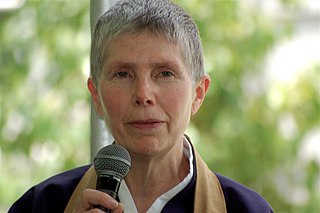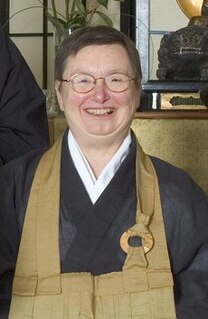
Hōun Jiyu-Kennett, born Peggy Teresa Nancy Kennett, was a British roshi most famous for having been the first female to be sanctioned by the Sōtō School of Japan to teach in the West.

JikaiDainin Katagiri, was a Sōtō Zen priest and teacher, and the founding abbot of Minnesota Zen Meditation Center in Minneapolis, Minnesota, where he served from 1972 until his death from cancer in 1990. He is also the founder of Hokyoji Zen Practice Community in Eitzen, Minnesota. Before becoming first abbot of the Minnesota Zen Meditation Center, Katagiri had worked at the Zenshuji Soto Zen Mission in Los Angeles and had also been of great service to Shunryu Suzuki at the San Francisco Zen Center, particularly from 1969 until Suzuki's death in 1971. Katagiri was important in helping bring Zen Buddhism from Japan to the United States during its formative years. He is also the credited author of several books compiled from his talks.

San Francisco Zen Center (SFZC), is a network of affiliated Sōtō Zen practice and retreat centers in the San Francisco Bay area, comprising City Center or Beginner's Mind Temple, Tassajara Zen Mountain Center, and Green Gulch Farm Zen Center. The sangha was incorporated by Shunryu Suzuki Roshi and a group of his American students in 1962. Today SFZC is the largest Sōtō organization in the West.

The term American Buddhism can be used to describe all Buddhist groups within the United States, including Asian-American Buddhists born into the faith, who comprise the largest percentage of Buddhists in the country.

John Daido Loori was a Zen Buddhist rōshi who served as the abbot of Zen Mountain Monastery and was the founder of the Mountains and Rivers Order and CEO of Dharma Communications. Daido Loori received shiho from Taizan Maezumi in 1986 and also received a Dendo Kyoshi certificate formally from the Soto school of Japan in 1994. In 1997, he received dharma transmission in the Harada-Yasutani and Inzan lineages of Rinzai Zen as well. In 1996 he gave dharma transmission to his student Bonnie Myotai Treace, in 1997 to Geoffrey Shugen Arnold, and in 2009 to Konrad Ryushin Marchaj. In addition to his role as a Zen Buddhist priest, Loori was an exhibited photographer and author of more than twenty books and was an avid naturalist.

Hakuyū Taizan Maezumi was a Japanese Zen Buddhist teacher and rōshi, and lineage holder in the Sōtō, Rinzai, and Sanbo Kyodan traditions of Zen. He combined the Rinzai use of kōans and the Sōtō emphasis on shikantaza in his teachings, influenced by his years studying under Hakuun Yasutani in Sanbo Kyodan. He founded or co-founded several institutions and practice centers, including the Zen Center of Los Angeles, White Plum Asanga, Yokoji Zen Mountain Center and the Zen Mountain Monastery.

Sōji-ji (總持寺) is one of two daihonzan of the Sōtō school of Zen Buddhism. The other is Eihei-ji temple in Fukui Prefecture. Fodor's calls it "one of the largest and busiest Buddhist institutions in Japan". The temple was founded in 740 as a Shingon Buddhist temple. Keizan, later known as Sōtō's great patriarch Taiso Jōsai Daishi, founded the present temple in 1321, when he renamed it Sōji-ji with the help and patronage of Emperor Go-Daigo. The temple has about twelve buildings in Tsurumi, part of the port city of Yokohama, one designed by the architect Itō Chūta.

Zen Mountain Monastery is a Zen Buddhist monastery and training center on a 230-acre (0.93 km2) forested property in the Catskill Mountains in Mount Tremper, New York. It was founded in 1980 by John Daido Loori originally as the Zen Arts Center. It combines the Rinzai and Sōtō Zen traditions, in both of which Loori received Dharma transmission. Loori's first dharma heir was Bonnie Myotai Treace, Sensei, who received shiho, or dharma transmission, from him in 1996. From Loori's death in October 2009 until January 2015, Zen Mountain Monastery had two teachers: Geoffrey Shugen Arnold and Konrad Ryushin Marchaj, who received Dharma transmission from Loori in 1997 and 2009, respectively. Since January 2015, the training at the Monastery has been led by Shugen Roshi, assisted by Ron Hogen Green, Sensei; Jody Hojin Kimmel, Sensei; and Vanessa Zuisei Goddard, Sensei.

Dennis Merzel is an American Zen and spirituality teacher, also known as Genpo Merzel.

Dai Bosatsu Zendo Kongo-ji, or International Dai Bosatsu Zendo Kongo-ji, is a Rinzai monastery and retreat center located in the Catskill Mountains of upstate New York. Maintained by the Zen Studies Society, Dai Bosatsu Zendo Kongo-ji is led by Shinge-Shitsu Roko Sherry Chayat Roshi. It is part of the Zen Studies Society, founded in 1956 to support the work of D.T. Suzuki.

Sanshin Zen Community is a Soto Zen sangha based at the temple Sanshin-ji in Bloomington, Indiana founded by Shohaku Okumura.

Jan Chozen Bays, is a Zen teacher, author, mindful eating educator, and pediatrician specializing in work with abused children.

Shodo Harada, or Harada Rōshi, is a Rinzai priest, author, calligrapher, and head abbot of Sōgen-ji — a three-hundred-year-old temple in Okayama, Japan. He has become known as a "teacher of teachers", with masters from various lineages coming to sit sesshin with him in Japan or during his trips to the United States and Europe.
Below is a timeline of important events regarding Zen Buddhism in the United States. Dates with "?" are approximate.

Gyokuko Carlson is a Soto Zen roshi and abbess of Dharma Rain Zen Center in Portland, Oregon, United States.

Geoffrey Shugen Arnold is Rōshi of the Mountains and Rivers Order (MRO) founded by John Daido Loori, from whom Shugen received shiho, or dharma transmission, in July 1997. As a lineage holder in the Sōtō tradition, Shugen currently serves as head of MRO and abbot of Zen Mountain Monastery in Mt. Tremper, New York, where he serves as the full-time resident teacher. Trained as a musician, Shugen was introduced to and began practicing Zen meditation in 1975. He began his formal training at Zen Mountain Monastery in 1984, and received tokudo, full monastic ordination, in 1988. Shugen's teachings have appeared in various Buddhist publications, including Buddhadharma: The Practitioner's Quarterly, The Mountain Record and in The Best Buddhist Writing 2005 and 2009. His dharma talks are available for sale through the Monastery Store and as a free podcast at WZEN.org. He is the author of O, Beautiful End, a collection of Zen memorial poems, published by Dharma Communications in 2012.
Yvonne Rand was a "lay householder" Soto Zen priest and guiding teacher of Goat-in-the-Road located in Anderson Valley, Mendocino County, California, a meditation center which practices predominantly Soto Zen but also incorporates elements of Theravada and Vajrayana Buddhism.
Daiyuzenji is a Rinzai Zen Buddhist temple located on the north side of Chicago, Illinois, in the United States.
Zen was introduced in the United States at the end of the 19th century by Japanese teachers who went to America to serve groups of Japanese immigrants and become acquainted with the American culture. After World War II, interest from non-Asian Americans grew rapidly. This resulted in the commencement of an indigenous American Zen tradition which also influences the larger western (Zen) world.


















